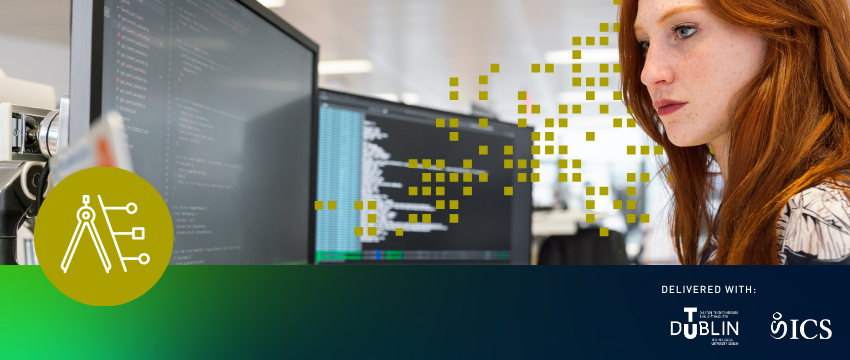MSc in Software Solutions Architecture
Build the foundations of tomorrow’s tech solutions.
This exciting part-time programme gives current and potential Software Architects the skills, theory and recognition they need to develop in their role. For the first time, candidates can gain a full Masters of Science degree in this specialist area through a mixed learning process with an emphasis on practical application in the workplace.
This course will formally certify your status as a highly skilled, high-performing software architect, with an internationally recognised qualification.
Why was the programme created?
Most software architects grow or develop into their role with no formal standards, certification or training in the practice of software architecture. They are usually highly skilled, competent and high performers but many express a need for recognition of their role in the form of an accredited academic qualification with opportunities for developing and expanding their skill sets and creating the prospect for long-term progression along their career path. Equally, companies are keen to retain these highly skilled employees and develop an architecture-capability pipeline as well as preparing new or prospective software engineers to be successful in an Architect’s role.
Technology Ireland ICT Skillnet analysed these challenges and, with the support of our Industry Steering Group, we developed a programme concept based on the outputs of a workshop session with representatives from companies that included Cisco, IBM, Ericsson and Fidelity. Technological University Dublin (Tallaght Campus), the Irish Computer Society (ICS), and the International Association of Software Architects (IASA) were appointed to produce the content deliver this masters programme.
Who is the programme for?
This programme has been uniquely designed to cater for:
- Current software architects who want to gain a recognised qualification to help them develop in their role and career.
- Graduates in related fields looking to progress into the emerging field of software architecture to increase their employment potential.
The programme will start with a 2-day workshop that will involve all students being physically present. This is seen as important to facilitate networking, experience sharing and group learning.
Lectures are held online two evenings per week, from 6.30 to 9.00pm. The lectures are primarily on Tuesdays and Thursdays. Occasionally, classes may alternate between Wednesday and Thursday to facilitate guest speakers. Lectures will be streamed live and will be available for download and offline viewing.
Some optional additional on-campus events may also be held. There are 2x examinations which are generally held on campus over the period of the programme.
Schedule
Lectures are held on two evenings per week. In the first year, the lecturers are normally Tuesdays
and Thursdays from 6.30 to 9.00 pm. Videos of the lecture are available to view afterwards.
Orientation and lectures always take place on Friday and Saturday within the last two weeks of January from 9am-5pm.. The official dates will be confirmed in September 2024.
The programme has seven modules spread over Semesters 1, 2 and 3 and a major Research Project in Semester 4.
Semester 1-3:
- IT Architecture Design
- IT Environment
- Business Technology Strategy
- Human Skills for the IT Architect
- IT Architecture Quality Attributes
- IT Architecture in Practice
- Research Methods
Semester 4:
- Research Project / Dissertation
The Research Project component, to be conducted in-company and addressing a relevant real-world problem or issue, will be formulated as a research question, then executed as a project, with the outcome written up as a Dissertation of circa 15,000 words.
The Research Project will need to demonstrate a full engagement with the programme content and with relevant academic sources so that the outcome is a valid piece of research appropriate to a Masters (NFQ Level 9) qualification. TU Dublin staff and in-company members will guide and supervise the project. The Research Methods module in Semester 3 is designed to prepare and develop the participant’s ability to complete the Research Project.
For further breakdown on modules and programme information, please click here to download the MSc in Software Solutions Architecture programme brochure.
Graduates of this programme will develop the required knowledge, skills and attributes in human dynamics, business, technology and strategy, IT Architecture, IT Quality Attributes and Environments, to support them in growing their roles as an IT/Software Architect. Graduates are also prepared to carry out applied research in topics at the cutting edge of software architecture.
This course will equip both established and aspiring software architects with:
- Informed, industry-aligned understanding of their role
- Frameworks, approaches and tools for executing software architecture tasks
- Knowledge base of current best software architectural practice and experience
- The ability to communicate effectively with a range of stakeholders
- The capacity to understand technology initiatives from a broad business perspective
- Understanding of how to make strategic technical decisions
- Internationally certified and validated academic recognition
Academic Eligibility
Prospective participants must either (a) be serving in the role of software architect, or (b) be aspiring to move into such a role. All participants must have substantial experience of IT software and systems development and implementation in team and technical leading roles. They must also have current competence to interact with development teams at a deep technical (i.e. specification and coding) level.
Applicants should have a primary degree (Level 8) in Computer Science or a cognate/science discipline or a degree with a high level of mathematics.
For candidates who do not meet this minimum entry requirement, the college operates a Recognition of Prior Learning (RPL) scheme whereby applicants may be considered based on relevant work or other experiences.
For applicants whose first language is not English, please note the English language entry requirements.
Fees
The fees for this programme are part-funded by Technology Ireland ICT Skillnet. The reduced programme fees for 2025 programme intake are to be confirmed. Please use the enquiry form to be informed when the fees are confirmed.
Part-funded fees are only available to eligible applicants*.
*Funding Eligibility
Applicants must be working in a private or commercial semi-state organisation registered in the Republic of Ireland (Business, Consultant, Freelancer) to avail of the grant-aided fees. As a government-funded training network, we can only support those meeting these criteria.
Applicants who do not meet our funding criteria may in some cases be able to apply and pay the full fee if there are available places. Contact us for more information.
Please click the “Apply Now” button and submit a copy of your CV for the first stage of screening.
The following documents will be required at the second stage of the application process:
- Transcripts of your Primary Degree OR Industry Certifications.
- If you’re an international student, i.e. did third-level education in a different country where English is not the first language then we need your English Language certification.
Click here for details about the English Language requirement component.
3. A letter from your company confirming your current role.





